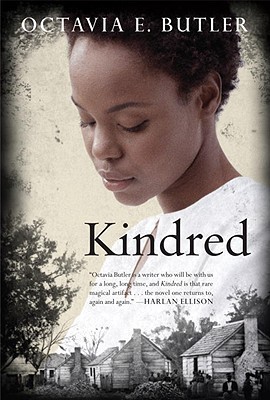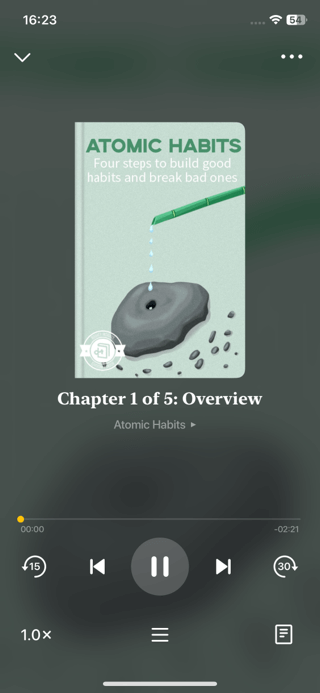Last updated on 2025/05/01
Kindred Summary
Octavia E. Butler
Time-traveling truths of slavery and survival.
Last updated on 2025/05/01
Kindred Summary
Octavia E. Butler
Time-traveling truths of slavery and survival.
Description

How many pages in Kindred?
288 pages
What is the release date for Kindred?
In Octavia E. Butler's powerful novel "Kindred," readers are thrust into a harrowing exploration of the complexities of race, identity, and the inherited scars of American history, as the protagonist, Dana, is inexplicably transported back to Antebellum Maryland. Struggling to navigate a brutal world of slavery and oppression, Dana's journeys force her to confront her own ancestry and the painful ties that bind her to the past, raising profound questions about the legacy of slavery and its influence on contemporary life. Butler masterfully blends elements of science fiction and historical fiction, making "Kindred" not only a gripping narrative of survival and resilience but also a poignant reflection on how the echoes of history resonate through generations. This compelling tale challenges readers to examine their own connections to the past and consider what it truly means to be free.
Author Octavia E. Butler
Octavia E. Butler was a groundbreaking American science fiction writer, renowned for her powerful storytelling and exploration of complex themes such as race, gender, and identity. Born on June 22, 1947, in Pasadena, California, Butler faced significant challenges as a black woman in a predominantly white male genre. Her work often blends speculative fiction with social commentary, creating narratives that delve into historical injustices and potential futures. Best known for her novels including "Kindred" and the "Patternist" series, Butler's writing not only earned her critical acclaim, including multiple Hugo and Nebula Awards, but also helped to pave the way for future generations of diverse voices in literature. Through her imaginative and thought-provoking works, Butler has left an indelible mark on the landscape of science fiction, inspiring readers and writers alike to confront uncomfortable truths about society.
Kindred Summary |Free PDF Download
Kindred
Chapter 1 | Prologue
In the prologue of "Kindred," we meet Dana, a modern Black woman who is left grappling with the trauma of losing her arm in a mysterious incident. She starts by revealing the physical and emotional toll of this event, emphasizing that it wasn't just a physical loss but also a loss of security and normalcy in her life. When the police arrive, they question her about the injury, using the term "hurt" in a dismissive way that frustrates her—this was no simple hurt; she had lost an arm. Dana's concern shifts to Kevin, her partner, whom the police mistakenly suspect might be responsible for her injury. Despite her weakened state and the pain she feels, Dana insists on Kevin’s innocence, even as she struggles to articulate the bizarre circumstances surrounding her injury. When Kevin finally appears at her bedside, Dana feels comforted by his presence. Their interaction reveals a deep bond; he reassures her and supports her through the trauma. As they discuss the event that led to her injury, Dana learns that Kevin had been held briefly by the police but was released because of her insistence on the incident being an accident. Though he tells her he shared a version of the truth with the deputies, Dana doubts that they would truly understand the inexplicable nature of what happened. They both express confusion over the incident, encapsulating the surreal nature of Dana’s experience. The disconnect between their modern reality and the inexplicable violence of her injury hints at larger themes of history, trauma, and the haunting legacies of the past that will unravel as the story progresses. The prologue sets a tone of tension and intrigue, capturing the daunting sense of uncertainty Dana faces while also establishing the love and support she has from Kevin.
Chapter 2 | The River
In Chapter 2 of "Kindred" by Octavia E. Butler, we dive into the chaotic and life-altering events of June 9, 1976, which happens to be the protagonist Dana's twenty-sixth birthday. She and her husband Kevin have just moved into their new home in Altadena, and while the day starts quietly with unpacking, everything shifts dramatically when Dana suddenly feels dizzy and collapses. Without understanding how, she finds herself transported to a lush, unfamiliar landscape by a river. In a moment of instinctive bravery, she sees a young boy named Rufus drowning and rushes to save him. After battling through panic and uncertainty, Dana successfully performs mouth-to-mouth resuscitation, reviving Rufus just as his distressed mother arrives on the scene. However, her relief is short-lived as the mother, overwhelmed with emotion, mistakenly accuses Dana of harming her son, leading to a frantic confrontation. Just as chaos erupts, Dana is once again plunged back into her living room, disoriented, muddy, and shaken. Kevin, bewildered by her sudden appearance and the transformation of the space, tries to process what just happened. Dana recounts her harrowing experience, emphasizing the vividness of the moment and her panic, which leaves her feeling vulnerable and unsafe. They share a tense exchange as Kevin struggles to reconcile reality with Dana's extraordinary ordeal. Throughout this chapter, themes of trauma, the unknown, and the intersections of past and present are explored. Dana grapples with feelings of disbelief and fear about the possibility of further episodes, questioning her own sanity and safety. This chapter sets the stage for an exploration of the complexities of her identity as she is thrust into different time periods, highlighting the tangible, visceral impact of historical legacies on personal experiences. The tension between what is real and what is perceived creates an emotional depth that compels readers to reflect on the nature of memory, trauma, and survival.
Key Point: The intersection of past and present shapes our identity and understanding of the world.
Critical Interpretation: In this chapter, as you witness Dana’s harrowing experience of saving Rufus, you are reminded of how vital it is to confront the echoes of history that shape your identity today. The sudden shift from the familiar to the unknown embodies the unexpected challenges life can present, much like the struggles you face in your own journey. This realization urges you to embrace your past, acknowledge the pain of trauma, and recognize its impact on your present self. By understanding your history, you learn to navigate life's uncertainties with courage, compassion, and a deeper sense of self-awareness, allowing you to forge a resilient path forward.
Chapter 3 | The Fire
In Chapter 3 of "Kindred" by Octavia E. Butler, we find Dana reeling from her traumatic experiences after her last trip through time. After a night of fear and anxiety, she showers and tries to feel normal again, but the memory of Rufus and his parents lingers vividly in her mind. Despite Kevin’s efforts to help her celebrate her birthday, Dana is too shaken to go out. She feels an overwhelming dread that something bad might happen again, and when they sit down to eat, she is suddenly whisked away again without warning. This time, Dana finds herself in a room with a young Rufus, who is inadvertently setting his draperies on fire. She jumps into action, putting out the flames, but realizes this time she's stuck in the past, uncertain about how to return home. Rufus is older and not the same boy she rescued from drowning, raising her confusion and concern. He eventually reveals his name and admits to having a vague memory of her saving him. Their conversation reveals a shared, troubling connection between them and hints at the complex dynamics of their future encounters. As their conversation deepens, Rufus reveals the violent nature of his home life, making it apparent that he was beaten by his father. In contrast to the child Dana met before, this Rufus is older, bearing the marks of a difficult upbringing in a harsh society. The emotional weight of their exchanges reflects broader themes of race, identity, and the burden of ancestry, as Dana grapples with the implications of her being a descendant of Rufus. Dana learns that they are on the Weylin plantation, owned by Rufus’s father, Tom Weylin. The conversations reveal alarming insights into the era's brutality. Rufus’s crisscrossed scars signify a troubled and abusive relationship with his father, sending Dana into moral turmoil about what to do with this knowledge. Their dialogue is laced with innocence yet starkly reveals the dark realities of slavery and the fragility of existence within that context. When Dana urges Rufus to reconsider using violent means for revenge against his father, their relationship takes a complex turn, reflecting haunting themes of parental harm and the impact of violence on the psyche. The chapter explores the effects of power dynamics in their relationship, complicating the reader’s understanding of agency and survival in an unjust societal structure. As Dana grows increasingly anxious about her safety in the past, she plans to leave Rufus and find Alice, a free woman she learns is connected to him. The chapter culminates in a harrowing moment when Dana escapes from Tom Weylin’s house only to face potential danger from patrollers hunting runaway slaves. This escalating tension leads to a violent confrontation with one of the patrollers, who physically assaults her but is ultimately knocked unconscious by Dana during a desperate struggle. Finally, just as it seems all hope is lost, Dana is yanked back to the present, finding herself bruised yet alive, back in her home with Kevin. This chapter deftly navigates themes of trauma, survival, and the continuation of the lineage of pain while underscoring the realities faced by those in marginalized positions in America’s history. Dana’s experiences provoke a deeper understanding of her ancestors’ struggles, compelling her to confront the importance of her role in their survival through time.
Key Point: The power of confronting trauma
Critical Interpretation: In Chapter 3 of 'Kindred,' Dana's experiences force her to face the harrowing effects of her ancestral trauma head-on. This pivotal revelation inspires you to acknowledge the weight of your own past, understanding that confronting your fears and traumas is essential for growth. Just like Dana's journey through time reveals the impact of pain on her lineage, your willingness to confront personal and collective traumas can transform your future. Embracing this proactive approach not only liberates you from the chains of your history but also empowers you to forge a more resilient self, capable of overcoming present challenges with strength and clarity.
Chapter 4 | The Fall
In Chapter 4 of "Kindred" by Octavia E. Butler, we continue to delve into the life of Dana as she navigates the complexities of time travel between her present and Rufus’s 19th-century Maryland plantation. The chapter starts with Dana meeting Kevin at a labor agency, where she describes the chaotic atmosphere filled with desperate job seekers. A connection forms between them as they bond over their shared hardships and aspirations, revealing both characters’ ambition, loneliness, and struggles against societal expectations. Their relationship deepens during lunch breaks, where Kevin encourages Dana to nourish her passion for writing, despite the oppressive environment of the agency. When Dana is transported back to Rufus’s time, she grapples with fear for her safety, anxious about the unpredictability of her travels and the potential dangers of being trapped in the past. Upon her return, Dana finds herself in the woods where Rufus has fallen and injured his leg. This chance encounter brings both characters closer, asserting a bond that neither fully comprehends yet. Rufus’s reliance on Dana opens a new dynamic; he expresses vulnerability that contrasts with his upbringing in a harsh, slave-holding society. Their interactions explore the complex dynamics of power and dependency throughout different eras. As the chapter progresses, Dana’s efforts to teach Rufus ethics clash with the reality of their societal roles, leading her to wrestle with the implications of her presence in his life. There’s a yearning for Rufus to grow into someone who recognizes the humanity of enslaved people, and Dana sees teaching him as a potential path toward that future. However, complications arise with the Weylin family, particularly with Tom Weylin. After Dana begins teaching Nigel, a young slave, how to read—a subversive act in this context—she faces serious repercussions when Tom catches her. The threatening tension escalates as Weylin physically assaults Dana for having engaged in the act of reading, an act that symbolizes rebellion against his oppressive authority. Through physical violence and emotional turmoil, this chapter vividly illustrates the perils of Dana's situation, the complexity of her relationships, and the harsh realities of slavery. The themes of resistance, survival, and the quest for identity resonate throughout the narrative, foreshadowing further struggles ahead for Dana as she endeavors to navigate her connection with Rufus while confronting the brutality of his world. In a harrowing climax, both physical and psychological pain culminate in Dana's fainting after a violent whipping from Tom Weylin, leaving readers anxious for what lies ahead and the potential ramifications of her time in the past. The chapter establishes critical groundwork for the exploration of legacy and the systems that perpetuate oppression and violence across generations.
Key Point: The importance of nurturing connections and mentorship in a challenging environment
Critical Interpretation: In Chapter 4, Dana's relationship with Kevin serves as a powerful reminder of how vital it is to cultivate meaningful connections, especially in times of hardship. As Kevin encourages Dana to pursue her passion for writing amidst the chaos of their job-seeking environment, it highlights the importance of support systems in fostering personal growth and resilience. This notion can inspire you to seek and nurture relationships that uplift and challenge you, pushing you toward your goals, even when faced with systemic pressures and societal expectations. Through mentorship and mutual encouragement, you can find strength, gain new perspectives, and navigate your own challenges with a renewed sense of purpose.
Chapter 5 | The Fight
In Chapter 5 of "Kindred" by Octavia Butler, tensions escalate around the protagonist, Dana, as she struggles with her complex relationship with both her husband Kevin and the past she has been pulled into. The chapter opens with Dana recounting her life with Kevin in 1976, their living arrangements, and hints at their impending marriage, set against the backdrop of societal prejudice as they navigate their interracial relationship. As Dana reflects, Kevin proposes to marry her, and despite their love, there’s an underlying anxiety about how their families would react. The couple is aware of the lingering effects of societal racism and expectations—Kevin’s sister and Dana’s aunt and uncle express disapproval that resonates in their discussions. Dana's past experiences shape her perspectives on love, autonomy, and obligation. Things pivot abruptly when Dana is drawn back to the antebellum South, where she discovers that Rufus, her white ancestor, has become increasingly dependent on her. Their relationship develops into one fraught with power dynamics. Rufus's desires become troublingly possessive, revealing the horrors of slavery as he views Dana as both a lifeline and a possession. The chapter reaches a climax when Dana witnesses Rufus's violent fight with a black man, and ultimately, the club of inevitability—the whip—comes crashing down on her. Injured and traumatized, she struggles but fights against the brutal realities that intertwine her existence in both timelines. Rushed back to the present, the theme of trauma continues as she grapples with her physical scars and the psychological burdens of her experiences. In grappling with the past, Dana's dilemma intensifies as she is caught between her freedom in the present and the oppressive reality of her historical lineage. The chapter poignantly illustrates her resilience as she prepares to break free from the chains of the past, igniting a fierce determination to seek freedom for herself and others while contending with the harsh realities of her lineage and the significant impact of her choices on her own life and those around her. Amidst the emotional turmoil, Dana clings to hope—hope for love, for freedom, and for a better future.
Key Point: The struggle for autonomy amidst societal oppression
Critical Interpretation: Dana's journey in Chapter 5 of 'Kindred' encapsulates the struggle for autonomy in the face of overwhelming societal oppression, presenting a powerful reminder for us to champion our own independence against external pressures. In a world where the norms and expectations can weigh heavily on our choices, Dana's resilience encourages you to reflect on and assert your autonomy, particularly in your relationships and personal aspirations. It inspires you to confront the chains of societal prejudice, whether they are direct or subtle, and to cultivate a life that aligns with your values and desires, ultimately empowering you to break free from limiting beliefs and forge your own path.
Chapter 6 | The Storm
In Chapter 6 of "Kindred," titled "The Storm," Dana wakes up on her living room floor in 1976, where she finds Kevin by her side after a tumultuous return from the antebellum South. Despite physical pain, Dana is relieved that they are both safe at home. The chapter explores their emotional struggles upon returning to their normal lives, particularly Kevin's unsettling adjustment after being away for five years. As Kevin grapples with feelings of displacement and confusion, Dana reflects on how her past experiences in the slaveholding South feel even more vivid and familiar compared to her present surroundings. Dana notices Kevin’s subtle similarities to the historical figures of her past and is troubled by his emerging frustration. Their intimate connection helps ease the tension of their shared trauma, and they find solace in simple gestures of affection. However, their comfort is short-lived, as Dana becomes increasingly aware of Kevin's mental state, echoing her own internal battles from her time in the past. The narrative shifts abruptly when Dana is thrust back into the 19th century during a violent storm, finding herself drenched and confused outside the Weylin plantation. The tension escalates when she discovers Rufus, once again in peril, lying unresponsive in the rain. After rescuing him, the reality of her situation hits her hard. Dana's efforts to stabilize Rufus highlight the complexities of their relationship, anchored in necessity despite strained dynamics. Back on the plantation, Rufus's repeated struggles with self-harm and substance abuse resurface. Dana's role as both caretaker and reluctant ally becomes increasingly fraught as she confronts Rufus's dependence and reckless behaviors. The chapter captures the stark realities of slavery and the desperate fight for dignity, power, and identity. Through intense interactions with Rufus and the plantation's oppressive environment, Dana is forced to negotiate her role, not just as a protector but as a survivor in a world that constantly challenges her agency. As Rufus's life hangs in the balance, the chapter culminates in the depiction of systemic violence and the emotional cost of slavery. With Dana’s somber reflections and the birth of complex relationships within the characters, Butler underscores enduring themes of trauma, survival, and the bittersweet essence of humanity amidst suffering. The chapter concludes with ominous developments that leave readers in suspense, highlighting the perilous nature of Dana's existence in both past and present contexts.
Chapter 7 | The Rope
In Chapter 7 of "Kindred," titled "The Rope," we find Dana waking from a dark and disorienting sleep, realizing she has returned home after another harrowing trip to the past. As she comes to, she finds herself bandaged and lying beside her husband, Kevin, who is visibly concerned about her recent self-harm. Dana admits that she cut her wrists to ensure her return home from an agonizing situation involving Rufus, who has grown increasingly powerful and ruthless since her last visit. Despite the pain she feels, Dana acknowledges the decision she made, reflecting on the weight of her circumstances and the complex relationship she has with Rufus. Kevin learns that Dana was gone for eight months–a strikingly longer duration compared to the few hours he spent worrying for her. The stark transition between their lives reveals the depth of Dana’s trauma and the moral dilemmas she faces, including the consequences of Rufus’s actions, like the sale of a man away from his family, which leads Dana to confront the fact that Rufus is a product of his time and culture. As the days unfold, Kevin and Dana find solace together, yet the shadow of Rufus looms over them. They discuss the implications of Dana's return and what being pulled back into Rufus's life would mean for them both, especially when Dana learns that her friend Alice has tragically taken her own life after Rufus sold her children away. This news plunges Dana into despair and anger, and she feels compelled to respond not just to Rufus, but to a system that continually exploits and dehumanizes. Rufus, upon calling Dana back, is revealed to be more isolated and unstable, grappling with loss and desperation. When Dana finds Alice’s lifeless body, the reality of slavery's brutality hits hard, forcing her to confront the dichotomy of her feelings toward Rufus. He wants Dana close, but his actions lead to the deaths and suffering of those around her. The chapter reaches a critical turning point as the complex interplay of control, survival, and moral compromise intensifies. Rufus’s desire for Dana crosses dangerous lines, suggesting he sees her not only as a companion but as an extension of himself and a remedy for his loneliness. In a harrowing climax, Dana feels compelled to defend herself as Rufus attempts to assert his dominance over her once more, leading to a violent struggle. In a desperate act of self-preservation, she stabs Rufus, fully aware that this act will sever their connection—both literally and metaphorically—tearing her away from that time and place as she returns to her own world, her arm painfully joined to the wall where she escapes. The chapter highlights themes of agency, the cyclical nature of trauma, and the burdens of history, showcasing Dana’s struggle to navigate her identity and moral dilemmas in a world fraught with violence and oppression. Through her shocking decisions and desperate circumstances, we see not only her resilience but the deep scars that history leaves on personal lives. As she returns home, she is faced with the profound consequences of her actions and the unshakeable link to the past that continues to haunt her.
Chapter 8 | Epilogue
In the epilogue of "Kindred," Dana and Kevin finally make a trip to Maryland after Dana's arm heals, revisiting the landscape tied to her ancestral past. As they drive through modern Baltimore and Easton, they observe major changes: new structures have replaced the historical sites that once defined Dana's experience of slavery. They visit a courthouse and an old church but realize that the Weylin house, where much of Dana's horrifying journey occurred, is now nothing but a cornfield. Despite its absence, Dana feels a compelling need to uncover Rufus's grave, suspecting he may be buried on the plantation. In searching for more connections to Rufus and her ancestors, they discover old newspaper clippings that discuss the fire that led to Rufus’s death, suggesting that it was not just a tragic accident but possibly a cover-up orchestrated by Nigel, a character from her past, to hide the true nature of Rufus's death. Their explorations lead them to consider the fates of other enslaved individuals who were sold after Rufus's death, leaving Dana filled with questions about their lives and whether families remained together. A poignant moment arises as Dana reflects on her past and grapples with the impact of her experiences, which can never be undone. The psychological scars she bears are a testament to the painful history of her ancestors and the legacy of slavery that still lingers. Through discussions with Kevin, the complexities of Rufus's character and the nature of their relationship come to light. Kevin’s accusations that Dana is defending Rufus reveal the struggle to reconcile their traumatic past with its present implications. The narrative emphasizes the themes of memory, trauma, and the burden of history, showcasing how Dana’s experiences have irrevocably altered her understanding of herself and her identity. The epilogue closes with Dana contemplating the existence of her ancestors, the concept of home, and her own scars—both physical and emotional. Kevin reassures her that their experiences are ultimately a shared truth, affirming that, even as they step back into their contemporary life, the richness of the past they encountered will forever shape their identities. The journey to Maryland, meant to understand her past, becomes a method for finding closure despite the persistent echoes of trauma that history has left behind. In this way, Butler captures the enduring connection between personal and collective histories, illuminating the complexities of kinship and the indelible impact of slavery embedded in American culture.










